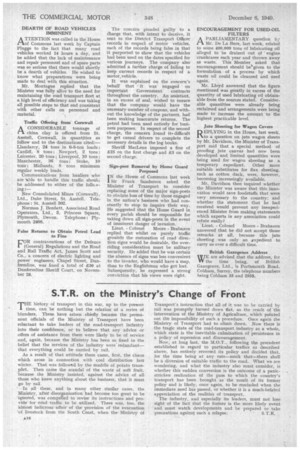S.T.R. on the Ministry's Change of Front
Page 18

If you've noticed an error in this article please click here to report it so we can fix it.
rihistory of transport in this war, up to the present time, can be nothing but the relation of a series of blunders. These have arisen . chiefly because the permanent officials of the Ministry of Transport have been reluctant to take leaders of the road-transport industry into their confidence, or to believe that any advice or offers of assistance from them were likely to be of service and, again, because the Ministry has been so fixed in the belief that the services of the industry were' redundant— that everything could be carried by rail.
As a result of that attitude there came, first, the chaos which arose in connection with coal distribution last winter. That was followed by the muddle of potato transport. Then came the scandal of the waste of soft fruit, because the Ministry insisted, against the advice of all those who knew anything about the business, that it must go by rail • In all these, and in many other similar cases, the Ministry, after disorganization had become too great to be ignored, was compelled to revise its instructions and provide for -"dad traffic to be utilized. There was, too, the amidst ludicrous affair of the provision of the evacuation of livestock from the South Coast, when the Ministry of Transport's instruction that all of it was to be carried by rail was promptly turned down flat, as the result of the intervention of the Ministry of Agriculture, which pointed out tire impossibility of such a procedure. Once again the Ministry of Transport had to climb down. Now there is the tragic state of the road-transport industry as a whole, which state is the inevitable culmination of persistence in a policy of repression and discouragement.
Now, at long last, the M.O.T., following the precedent established in regard to particular traffics as described above, has entirely reversed its policy and decided that, for the time being at any rate—mark that—there shall be a diversion of suitable traffic to the road. What we are wondering, and what the industry also must consider, is whether this sudden conversion is the outcome of a panicstricken realization of the pass to which the country's transport has been brought_ as the result of its former policy and is likely, once again, to be rescinded when the immediate need has passed, or whether it is a much-belated appreciation of the realities of transport.
The industry, and especially its leaders, must not lose sight of the fact that the former is the more likely event and must watch developments and be prepared to take precautions against such a relapse. S.T.R.




















































